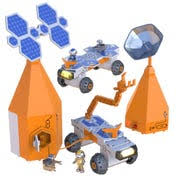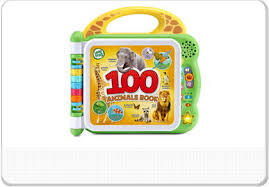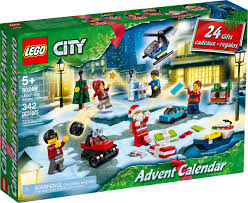|
|
Homeschoolers: Ethical Dilemmas in the Cards "what's the deal" Helps Kids Work Through Life's Hurdles
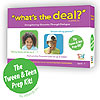 "what's the deal?" Game by ethiKids, inc. "what's the deal?" Game by ethiKids, inc.Age: 8 to 11 Gender: Boys and Girls Category: Educational MSRP: $15.95 What It Is: This story-card game features two children, Luke and Fiona, facing moral dilemmas, such as witnessing a bully or seeing money fall to the street unnoticed. Note cards help track discussion and adults are given tips for facilitating conversations with children. The accompanying booklet defines six values (such as fairness and honesty) and "value violations," and lists four skills (such as communication and making choices) that children can use to work through situations. 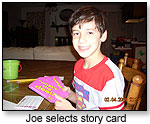 What the Moms Thought: “I like the values that are encouraged ... and the soul searching some cards require,” reported Zuidema. She, as did several moms, noted the benefit of this game to adults who do not naturally have the opportunity to discuss with their children moral dilemmas as they unfold. What the Moms Thought: “I like the values that are encouraged ... and the soul searching some cards require,” reported Zuidema. She, as did several moms, noted the benefit of this game to adults who do not naturally have the opportunity to discuss with their children moral dilemmas as they unfold. Wilson would have loved to have access to this game during her years as a youth group director and shelter counselor. “The ‘homework for adults’ and other instructional material were easily understood and equip the average (as in non-behavioral sciences major) adult to facilitate a discussion among students and open a one-on-one dialogue with a child,” she said. Ledford liked the concept of a “tween and teen prep kit,” and said that “any way that parents can help prepare children for those inevitable moral dilemmas is welcome.” Dawson “appreciated the fact that no answers, much less ‘correct’ answers, were provided.” Wilson liked the compact size of the box, although Shanahan thought “it might get lost under or behind the other games.” Shanhan added, though, “The communication skills taught are useful and important.” What the Kids Thought: “Alyssa (8) liked helping the characters decide what course of action they should take,” said Zuidema. Dawson’s children “enjoyed discussing those situations in which they could be a hero vicariously through Luke or Fiona.” Alyssa (8) was gratified when the choices she made displayed “good character.” The Wilson children called the situations “realistic.” “My children did not like this game,” Shanahan lamented. Alyssa Zuidema (8) found it “more like a test.” 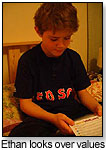 What the Kids Learned: “The game reinforced values that we discuss and try to live by in our household,” said Zuidema. Dawson agreed, pointing out that her children “learned … new situations in which they might apply the ethics they’ve already come to practice.” Ledford appreciated the communication and decision-making skills the game teaches. “Discussing topics in advance with Mom and Dad gives children the tools (words, ideas, actions) for those times when Mom and Dad aren’t there.” Dawson said her children learned new vocabulary: “Sara (6) didn’t know what ‘gratitude’ meant prior to testing this item.” How to Improve It: The Wilson kids suggested that the process would be more enjoyable and probably more effective if it were utilized as a "board game" with rewards/consequences for right/wrong choices. Several moms thought this might remove some artificiality from the one-on-one discussions. Wilson saw her children slip into “classroom mode” when playing this game, rather than their usual “free-flowing style” of conversation. “While their answers reflected our values, they seemed academic and not from the heart,” she explained. Shanahan found some of the situations presented too complex and unlikely for her children, but Zuidema noted that parents could simply substitute their own questions or situations, or remove those cards from the deck, as Ledford did. Although several moms agreed this game would be great for group settings, it “is not truly pertinent in a homeschool setting,” said Wilson, since “communication and values-based education are the heart of the homeschool.” Zuidema added, “We already discuss character, values and ethics and would choose to play a more traditional game.” Dawson noted that some terms were not familiar to her children. “The foreign vocabulary seemed to distance the situations from reality,” she said. Would You Want Another Toy Like This? “I could see using this product as an essay-starter in my homeschool, and I would pick and choose which subjects I wanted to cover,” Shanahan noted. Roundtable participants are former corporate accountant Robbin Dawson with Ethan (8) and Sara (6); Alison Shanahan with Katie (7); Teresa Wilson, editor of “HOMES Newsletter,” with Andrew (11), Elise (8) and Steven (6); Jill Zuidema, former retail manager, with Alyssa (8); and Susan Ledford, editor of the "Homeschool Resources Directory for SC,” with Victoria (12), Joe (8) and Griffin (2) .  Writer's Bio: Susan Ledford is the writer, editor and publisher of the "Homeschool Resources Directory for S.C." She has been evaluating toys and games for TDmonthly's Roundtable reviews since 2005. She also is a homeschool veteran of seven years. Read more articles by this author Writer's Bio: Susan Ledford is the writer, editor and publisher of the "Homeschool Resources Directory for S.C." She has been evaluating toys and games for TDmonthly's Roundtable reviews since 2005. She also is a homeschool veteran of seven years. Read more articles by this author |
| |||||||||||||||||||||||||||||||||
Disclaimer Privacy Policy Career Opportunities
Use of this site constitutes acceptance of our Terms of Use.
© Copyright 2025 PlayZak®, a division of ToyDirectory.com®, Inc.

